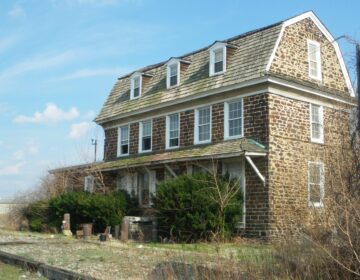Hard Rock renews interest in Atlantic City

A 2012 rendering of Hard Rock's proposal for its casino. The project was later abandoned.(AP Photo/Wayne Parry)
Having proposed and then scrapped a plan to build a casino in Atlantic City, the Seminole Indian tribe of Florida appears to be interested in the New Jersey gambling market again.
The tribe, through its Hard Rock franchise, has made filings with state casino regulators indicating it may take another shot at establishing a presence here.
Hard Rock, the global casino and entertainment company, asked New Jersey gambling regulators for a ruling on whether the tribe would need to qualify for a casino license should the company acquire or build one here. The company has been rumored for months to be interested in the struggling Revel Casino Hotel, whose owners are considering selling it.
In a ruling issued last month, the state Division of Gaming Enforcement said the tribe itself does not need to qualify for a license but listed several Hard Rock executives who would need to, including company President and CEO James Allen. Neither Allen nor a Revel spokeswoman responded to messages seeking comment.
The company’s filings indicated it planned to seek a statement of compliance, a preliminary step in determining who needs to seek and hold a casino license.
The New York Post reported earlier this year that Hard Rock is interested in making a bid for Revel. Atlantic City’s newest casino operated for less than a year before filing for Chapter 11 protection. Last year, its owners said they were considering ”strategic options,” which in the casino industry usually includes a sale or a bankruptcy filing.
Kerry Langan, a spokeswoman for the gambling division, said Hard Rock has already applied for a statement of compliance under the state Casino Control Act.
“That process allows an entity and persons associated with it to be investigated prior to an acquisition of a casino interest, and based on the investigation, they can be determined to meet certain licensure or qualification criteria,” she said. “As an initial step, Hard Rock sought rulings as to the entities and individuals necessary for it to obtain a statement of compliance.”
Hard Rock previously dipped its toe into the waters of Atlantic City’s gambling market but quickly pulled it back. In November 2011 it was accepted into a pilot program New Jersey was operating to permit construction of smaller “boutique”-style casinos that contained fewer than the 500 hotel rooms required by current regulations.
A musical history museum with rock ‘n’ roll memorabilia was a key part of Hard Rock’s proposal. Its hotel would have started at 208 rooms and eventually expanded to 850. The first phase of the project would have cost about $465 million.
But less than a year later, and without putting a shovel into the ground, Hard Rock scrapped the idea, “due to current market conditions.”
The company said it has “not eliminated this location for a future endeavor.”
_____________________________________________
This story first appeared on NBC10, which is a content partner with NewsWorks.org
WHYY is your source for fact-based, in-depth journalism and information. As a nonprofit organization, we rely on financial support from readers like you. Please give today.




